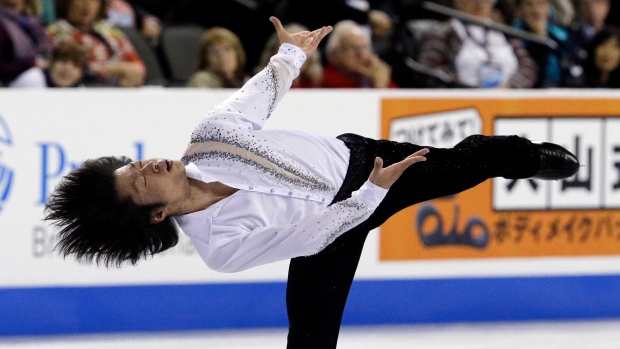Oct 24, 2014
Japan's Machida wins men's short program at Skate America
Amercans Madison Chock and Evan Bates won the Skate America ice dance short competition Friday night. Chock and Bates scored 68.96 points, outclassing the field in a competition that featured the Flamenco and Paso Doble.
The Canadian Press

HOFFMAN ESTATES, Ill. - Jason Brown was all revved up, ready to put on a show for his home crowd.
It didn't quite work out.
Brown fell early in his routine, and Japan's Tatsuki Machida dominated in the Skate America men's short program on Friday.
On a night when there were plenty of falls, Machida kept his footing and left the ice to loud cheers after wowing the crowd. With 93.39 points, he had a comfortable lead over American Jeremy Abbott (81.82) and Brown (79.75), the Chicago-area product.
"I couldn't have asked for a better crowd, really," Brown said. "The support, the love, it was really just awesome. I could hear everyone that I knew from home, and then I could hear different people in the crowd. I was so excited to be out there and skate at home."
But Machida skated away with a commanding lead after Americans Madison Chock and Evan Bates won the ice dance short competition.
The men's long program and ice dance free skate are Saturday evening, with the pairs and women's short programs earlier in the day. Gracie Gold, the 2014 Olympian and U.S. champion, leads the women's field along with two-time junior champion Elena Radionova of Russia.
Abbott stumbled on a triple axel early in his routine, and Brown went down performing the same move.
It was an especially difficult development for Brown, who is from Highland Park and drew attention with a silver medal at the U.S. championships in January. That and his ponytail make him one of the most recognizable skaters.
"Once I fell, I had that choice: Will I let this affect me or can I make up and try to get every single last point I can out of my program?" Brown said. "That's really the way I looked at it. I'm going to get up, I'm going to finish strong, I'm going to hit every note after this and I'm going to really focus on every detail so I can make up points along the way. I really feel like I was able to do that, so in that I feel successful."
Brown's homecoming also was the first time that music backed by vocals was allowed in a major singles or pairs event. It's a shift in a sport where instrumental pieces rule, but a desire to appeal to younger audiences sparked the move.
That wall came crashing down when Russia's Artur Gachinski performed to Michael Buble's rendition of "Cry Me A River."
"When you skate you can bring about the song, you can feel what the song has inside," he said. "I think it's a good idea."
Even so, switching to music with lyrics was not an easy decision. He said it's easier to get distracted.
"You start dancing like you're in the club," Gachinski said.
In the ice dance, Chock and Bates scored 68.96 points, outclassing the field in a competition that featured the Flamenco and Paso Doble.
The brother-sister combo of Americans Maia and Alex Shibutani (64.14) were second, with Russians Alexandra Stepanova and Ivan Bukin (56.37) in third.
North Americans have dominated ice dance in recent years, but reigning Olympic gold medallists Meryl Davis and Charlie White and 2010 champions Tessa Virtue and Scott Moir are not competing this season.
That leaves Chock and Bates to carry on the winning tradition, along with the Shibutanis, and the teams are holding the top two spots heading into Saturday's free skate.
"I think obviously the long goal is the 2018 Olympics, but this year is really important for us," said Bates, who placed eighth with Chock at the Sochi Games. "I think what we saw and really learned from Meryl and Charlie was we got a first-hand experience of what it is like to be the elite team in the world. We had the opportunity to train alongside them but also compete alongside them. I think our experience with them in Sochi was more than anything inspiring."
